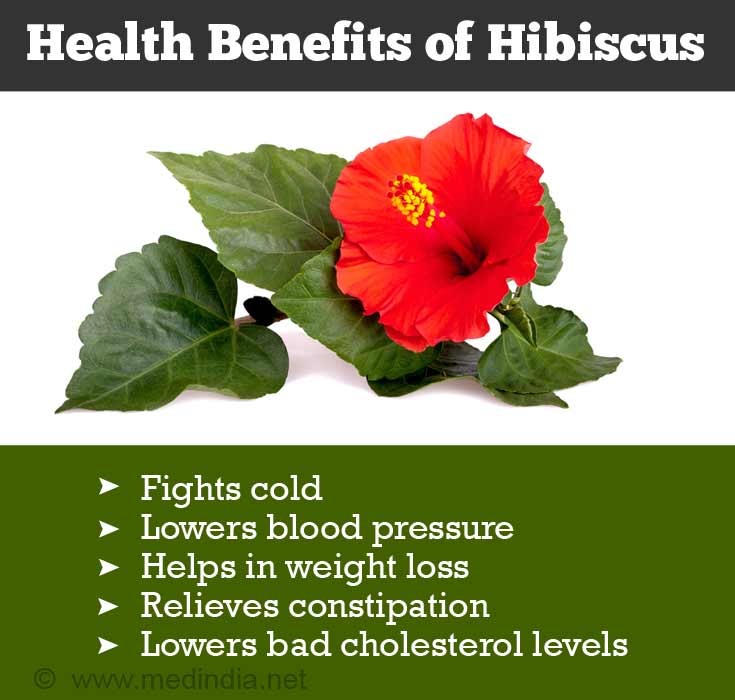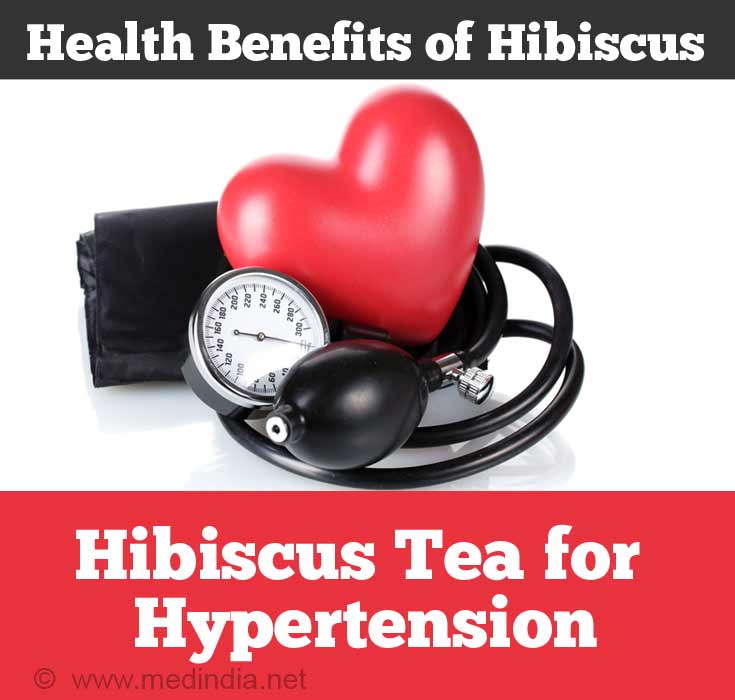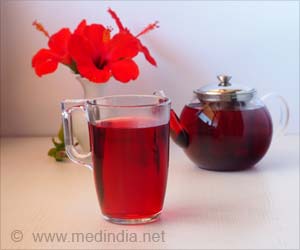- McKay DL, Chen CY, Saltzman E, Blumberg JB. Hibiscus sabdariffa L. tea (tisane) lowers blood pressure in prehypertensive and mildly hypertensive adults. J Nutr. 2010 Feb;140(2):298-303. doi - (10.3945/jn.109.115097. Epub 2009 Dec 16. PubMed PMID: 20018807.)
- Hibiscus tea: flower power - (http://nutritionfacts.org/2012/01/08/hibiscus-tea-flower-power/)
What is Hibiscus?
Hibiscus is a popular plant that has a long history of use in traditional remedies and folk medicine across the world. It belongs to a group of flowering plants called Malvaceae and actually includes hundreds of sub-species and variants, most of which are found in warm-temperate, subtropical and tropical regions.
The plants or shrubs of the species are known to have attractive looking flowers and all of these different variants are simply referred to as hibiscus or ‘rose mallow’. The species is quite diverse, not just in the variety of flowers, but also in growth patterns with some being annual and others perennial, and some comprising woody shrubs, while others are classified as the small trees.
No matter the variety, hibiscus is always widely used in various regional cuisines and folk medicine systems.
- In Egypt and elsewhere in the region, the flower of the plant is used to prepare a drink called Karkade
- In Iran, it is used to prepare what the Iranians refer to as ‘sour tea’
- In China, it is often referred to as rose tea
- In Africa, Latin America and the Caribbean Islands, where it is used to prepare a drink called sorrel
- It is also used to prepare certain drinks in South Asia and Southeast Asia
Hibiscus isn’t just used in the preparation of teas and beverages, however, but is also a popular culinary ingredient. Different parts of the plant are used to prepare jams, soups and sauces. Dried hibiscus is in fact considered a delicacy in parts of Mexico.

What are the Health Benefits of Hibiscus?
Hibiscus has a long history of use as a medicinal herb and it is believed to be effective in the treatment of various health conditions like appetite loss, common cold, upper respiratory tract pain and swelling, stomach irritation, and heart and nerve disorders among others.
Cure for Hypertension: Hibiscus tea has often been recommended as a cure for hypertension or high blood pressure, and this is one claim that has been validated by not one, but several studies. In some studies, it was clearly shown that the daily intake of hibiscus tea had a similar effect to medications for hypertension. One of these studies revealed that there was a marked improvement in hypertensive patients who were administered hibiscus tea as opposed to among those given a placebo.

Lowers Bad Cholesterol Levels: Hibiscus has been said to lower bad cholesterol or LDL levels when consumed in the form of a tea. This ability of hibiscus tea to lower cholesterol levels has been investigated on more than one occasion and the evidence is encouraging. Bioflavonoids in the tea are believed to be responsible for this cholesterol regulating action. In one such study, it was found that the intake of hibiscus tea not only controlled LDL or bad cholesterol levels, it also improved the levels of HDL or good cholesterol.
Protection against Free-Radical Damage: Hibiscus contains an abundance of antioxidants and this is believed to give it some amount of protective properties against some forms of cancer like stomach cancer and leukemia. Laboratory studies revealed that there was also a reduction in the oxidation of low-density lipoprotein, or bad cholesterol and reduced formation of arterial plaque. It is also believed that consuming hibiscus tea may offer some amount of protection to the liver and kidneys.

Helps in Weight Loss: Hibiscus tea and extract has also been popularized as a natural appetite suppressant that can help to lose weight. In one study it was also found that fat cell development was inhibited at an early stage because of an effect on the genes responsible for fat cell generation. While the idea of sipping on an herbal tea may seem quite enticing as opposed to taking dangerous medications to suppress your appetite there is a lot more research required. Keep in mind that consuming too much hibiscus can also raise toxicity levels and cause other health problems.
Fighting Colds and the Blues: Hibiscus tea is rich in an assortment of vitamins and minerals including vitamin C. In addition to an immune-boosting effect that probably explains its use as a folk remedy for the cold, this is also believed to help improve one’s feelings of relaxation and may reduce anxiety and stress. There is no evidence as yet to support these claims.
Relieves Constipation: According to some naturopaths, hibiscus tea works extremely well as a laxative because of naturally occurring fruit acids. Hibiscus tea was incidentally a popular folk remedy for constipation in Germany. Apparently, the regular consumption of hibiscus tea helps to regularize bowel movements and may even offer relief from common digestive issues.
Hibiscus Recipes
Hibiscus Tea
Ingredients:
- Dried hibiscus flowers – 2 cups
- Regular Water – 2 liters
- Sugar – 500 grams
- Vanilla extract – ½ teaspoon
- Lemons – 2
Preparation:
- Rinse the flowers and keep them aside for now.
- Heat the water in a saucepan and once it begins to boil throw in the hibiscus flowers.
- Remove the saucepan from the stove after adding the flowers and allow them to steep for the next ten minutes. Make sure to keep the saucepan covered during this time.
- You can then transfer the water from the saucepan to a pitcher or another saucepan but strain out the flowers and sediments while doing so.
- Add the sugar to the water.
- You can slice the lemons and collect the juice to add it to the water now. This is optional, as is the addition of vanilla extract.
- Once you’re done adding these additional flavorings you can keep it to refrigerate and serve chilled.






